 Go to NEWSLETTER BACK ISSUES
Go to NEWSLETTER BACK ISSUESGo to ARTICLE INDEX
Load Acrobat Version
"Then you will know the truth, and the truth will set you free." (John 8:32)
The REVEILLE EQUIPPER Second Quarter 2006, Vol. 10 No. 2
- Feature: Thinking about Truth and Persuasion
- Area Profile: Millions of Muslims Convert in Africa
- Area Profile: Religious and Ethnic Diversity in Iran
- News: Iran House Church Leader Arrest
- News: Afghanistan Apostate Implications
- Resource: Better Books on Islam
- Opportunity: Missions Conference for 25,000
- Opportunity: Help Turks Get Bibles
- Opportunity: Tax Funded Language Learning Tools
Truth and Persuasion in Cross-Cultural Context
by Dr. Bruce Sidebotham OVERCOMING OBJECTIONS TO THE GOSPEL
- How can one God be three?
- How can one person have two natures?
- How can God die on a cross?
- How can one man's righteousness replace another's sin?
. . . not in the heat of well-reasoned arguments
. . . but in the warmth of Jesus Christ when he is encountered in his followers.
PERSUASION HAS THREE PARTS
| T O O L S O F P E R S U A S I O N | |||
| Category: | P O W E R | R E A S O N | DEMONSTRATION |
| Description: | uses force, intimidation, superior position and/or authority | employs argument, logic, research and/or analysis | interprets history, personal testimony, personal and/or shared experience |
| corresponds to: | |||
|
Jesus' Identity: |
Way | Truth | Life |
| Eastern World View: | tarekat (way) | syariat (law) | hakekat (essence) |
| Western World View: | Will | Mind | Emotions |
| Modes of Expression: | Behavior | Words | Character |
| Sin-based Insecurities: | Fear | Guilt | Shame |
AMERICAN CHRISTIANS PREFER REASON
BUT MUSLIMS AND ATHEISTS WANT MORE
Most popular tools for presenting the gospel rely heavily upon logically presented propositional truths.
For example:
- The Four Spiritual Laws popularized by Bill Bright of Campus Crusade
- The Bridge to Life popularized by the Navigators
- Evangelism Explosion by D. James Kennedy of Coral Ridge Presbyterian Church
While American Christians resonate with logical gospel presentations and with rationally discrediting other systems, Muslims and atheists are rarely impressed and are often offended.
Perhaps Muslims and atheists are more impressed with "power" and "demonstration" than with "reason." This different perspective helps explain why . . .
- Muslims seem hypersensitive to humiliation (i.e. cartoons of Mohammed) yet enthusiastic about dialog.
- the pillars of Islam (public rituals to which all Muslims conform) define Muslim identity more than personal beliefs.
- activist seek to eliminate expressions of religious devotion from public life.
DOES TRUTH LEAD TO JESUS
- OR -
DOES JESUS LEAD TO THE TRUTH
Quoting John 8:32, "You shall know the truth and the truth will set you free," most American Christians expect that the truth, when it is properly presented and understood, will lead people to Christ. Actually this passage teaches the opposite.
Verse 32 of John chapter 8 must be read in the context of verse 31, "If you hold to my teaching you are really my disciples. Then you will know the truth, and the truth will set you free."
To Pilate at his trial Jesus said, "For this reason I was born, and for this I came into the world, to testify to the truth" (John 18:37). Jesus says his purpose is to show people the truth. He did this with power, reason, and demonstration.
Before challenging the Romans to be transformed by the renewing of their minds (Romans 12:2), the Apostle Paul urged them to submit to God as living sacrifices (Romans 12:1). Paul indicates that right allegiance precedes and leads to right thinking rather than right thinking preceding and leading to right allegiance.
Here is an illustration. Without unequivocal commitment to its mother, a baby cannot learn and grow. Babies do not learn about their mothers before depending upon them. Rather, they depend upon their mothers first and learn about them later. Like babies, we are children of God, not his students.
SECULAR SCHOLARSHIP ENDORSES INTEGRATED APPROACH
In The Geography of Thought: How Asians and Westerners Think Differently - And Why, Richard E. Nisbett reveals limitations of rational approaches for many audiences. Although Nisbett limits his research to people of European and East Asian origin, his work may apply to Middle Easterners and post-moderns.
Nisbett writes,
The difference between the two groups would seem to be that Americans are simply more in the habit of applying logical rules to ordinary events than Koreans and are therefore more capable of ignoring the plausibility of the conclusions. (p. 170)He goes on to say,
East Asians then, are more likely to set logic aside in favor of typicality and plausibility of conclusions. They are also more likely to set logic aside in favor of the desirability of conclusions. (p. 171)In other words, for many people the desirability and social power of their chosen faith system may override inherent inconsistencies and logical consequences.
By subordinating personal experience and social power to logical consistency, Evangelical Christians fail to make their faith relevant and transformational in a plural society where these factors often trump reason.
Nisbett identifies two laws of logic that cause cross-cultural misunderstanding and logical errors.
| LAW OF IDENITY | LAW OF NONCONTRADICTION | |
| Definition: | "A thing is itself and not something else." | "A proposition can't be both true and false." |
Nisbett says,
In the East Asian view, the law of noncontradiction applies only to the realm of concepts and abstractions. The rejection of conclusions because they seem formally contradictory can be mistaken, because concepts are merely reflections of things and it can sometimes be more sensible to admit that an apparent contradiction exists than to insist that either one state of affairs or its opposite is the true one. (p. 177)This is also the historical Christian view which allows us to embrace seemingly contracictory realities like the trinity, predestination, and the hypostatic union between God and man in Christ.
Nisbett describes three Eastern logical principles for resolving or transcending apparent contradictions. (pp. 174-175)
| 1. |
PRINCIPLE OF CHANGE |
The world is dynamic and constantly changing. Any long endurance of one state probably means that things are about to change. "Because reality is in constant flux, the concepts that reflect reality are fluid and subjective rather than being fixed and objective." |
| 2. |
PRINCIPLE OF CONTRADICTION |
"Because the world is constantly changing, opposition, paradoxes, and anomalies are continuously being created. . . . Opposites complete each other and make each other up." The two sides of an apparent contradiction exist in harmony and are connected conceptually. For example: From ugliness we understand beauty. From pain we understand comfort. From evil we understand good. |
| 3. |
PRINCIPLE OF HOLISM |
"As a result of change and opposition, nothing exists in an isolated and independent way, but is connected to a multitude of different things. To really know a thing, we have to know all its relations." |
These three principles create a whole.
Change produces contradiction and contradiction causes change; constant change and contradiction imply that it is meaningless to discuss the individual part without considering its relationships with other parts and prior states.CHRISTIAN APPLICATION
Power, reason, and demonstration also create a whole. Without relation to personal experience and social influence propositional truths will not persuade. No matter how apparently free of contradiction, if it doesn't set people free can it be truth?
Because of this principle of holism, Christian evangelism suffers when it has to excuse a lack of social influence (i.e. Hollywood), or apologize for historical impact (i.e. the Crusades).
Western civilization has a long history of embracing ideas for their logical consistency regardless of personal experience and social consequences (i.e. the world revolves around the sun). This affects Christian evangelism and non-Christian receptivity. Like the Koreans mentioned by Nisbett on page 171, Muslims and postmodern relativists probably consider whether something is typical, plausible, and desirable as seriously as whether or not it is logical.
In witnessing to non-Western and non-traditional populations Christians must augment logical arguments, apologetic defense, and propositional presentations with demonstrating the life and way of Jesus Christ.
Area Profile:
Africa: One Billion in Spiritual Turmoil
MUSLIM CLERIC SAYS 6 MILLION LEAVE ISLAM EVERY YEAR
The quotation below is translated from a transcript of the televised Al-Jazeera Arabic language call-in talk show "Islamic Law and Life." The guest, Sheikh Ahmad Al Katani, is the president of the Libya based Companions Lighthouse for the Science of Islamic Law which prepares imams for "evangelizing" in Africa. Even if agenda driven and exaggerated ten-fold, the referenced trends and statistics are startling.
The concept of evangelism is inviting the non-Christians to the Christian or Nazarene religion, and this is the right of every Christian and the right of every believer to call others to his faith. However, we are talking about a different matter which is Christianization. Christianization means the following: preparing plans, and executing these plans and evolving these plans to change Muslims into Christians by taking advantage of the ignorance and poverty . . . . So, we are faced with the issue of taking advantage of circumstances, taking advantage of humanitarian needs, taking advantage of the lack of education for example, that these people (missionaries) use to take Muslims out of their religion.View the full transcript at:Islam used to represent, as you previously mentioned, Africa's main religion and there were thirty African languages that used to be written in Arabic script. The number of Muslims in Africa has diminished to 316 million, half of whom are Arabs in North Africa. So in the section of Africa that we are talking about, the non-Arab section, the number of Muslims does not exceed 150 million people. When we realize that the entire population of Africa is one billion people, we see that the number of Muslims has diminished greatly from what it was in the beginning of the last century. On the other hand, the number of Catholics has increased from one million in 1902 . . . to 330 million in the year 2000.
As to how that happened, well there are now 1.5 million churches whose congregations account for 46 million people. In every hour, 667 Muslims convert to Christianity. Everyday, 16,000 Muslims convert to Christianity. Ever year, 6 million Muslims convert to Christianity. These numbers are very large indeed.
www.formermuslims.com/forum/viewtopic.php?t=972
F E A T U R E S
- Christian and Muslim Engagement
- AIDS, genocide, corruption, poverty & civil war
- Several of the world's deadliest humanitarian crises
- Millions leaving Islam every year
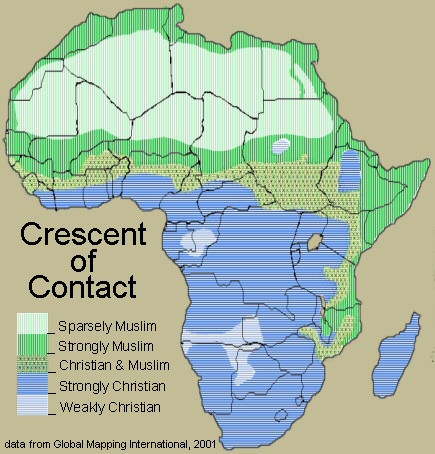
A L A N D O F H U M A N I T A R I A N C R I S I S
- Many internally displaced persons (IDPs) in the Darfur region of Sudan are wondering why it is the Christians who are helping them and not Arab Muslims. Visitors to the camps report up to 60% are disenchanted and no longer following Islam.
- The Democratic Republic of the Congo (formerly Zaire) experiences the equivalent of two Southeast Asian tsunamis every year in deaths from preventable diseases like dysentery.
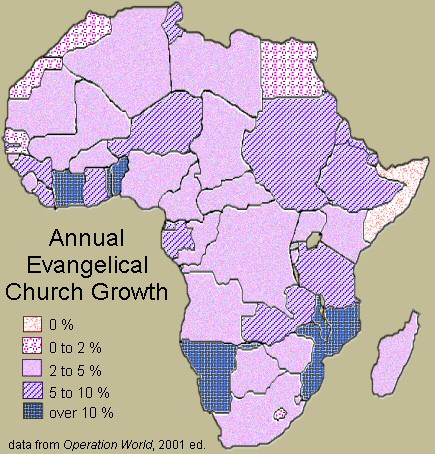
Area Profile:
Iran: Land of Religious and Ethnic Diversity
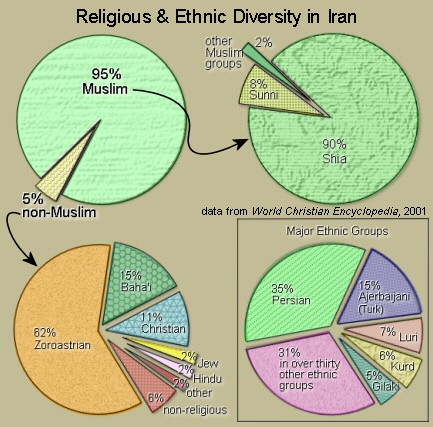
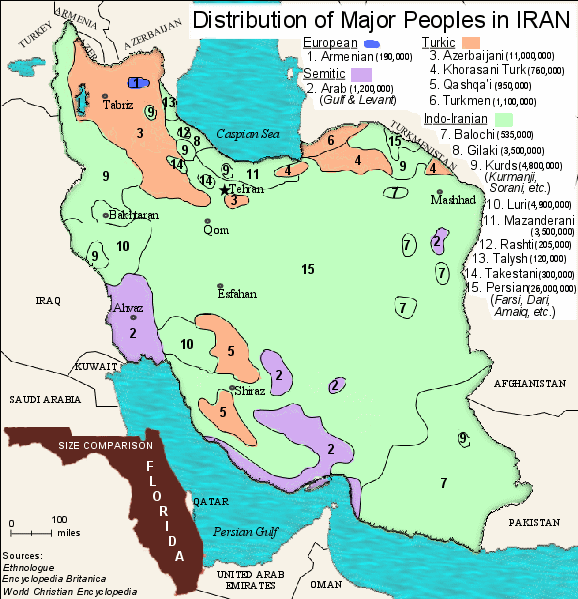
News:
House Church Leader Oppressed in Iran
by Barbara G. Baker
from Compass Direct
www.CompassDirect.org
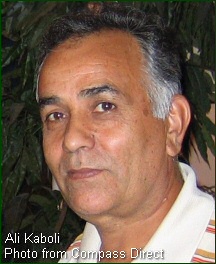 An Iranian Christian who converted from Islam 33 years
ago is under arrest and interrogation in northern Iran,
where secret police have held him incommunicado.
An Iranian Christian who converted from Islam 33 years
ago is under arrest and interrogation in northern Iran,
where secret police have held him incommunicado.
Ali Kaboli, 51, was taken into custody on 2 May from his workshop in Gorgan, capital of Iran's northern province of Golestan. With the exception of one brief telephone call, he has been refused contact with any visitors.
As of 22 May no charges had been filed against Kaboli, who has been threatened in the past with legal prosecution for holding "illegal" religious meetings in his home. He could also be charged for converting to Christianity, which under Iran's apostasy laws calls for the death penalty.
After Kaboli's arrest, a number of the Christians attending Kaboli's house-church were called in by the police and questioned, one by one.
Kaboli is married with five grown children; his family has declined to comment on the situation.
A carpenter by trade, Kaboli has for decades hosted house church meetings in his home, which was once burned down by unidentified arsonists. Much of his spare time has been spent as an itinerant evangelist, leading small meetings for worship, Bible study and discipleship in various towns and cities along the Caspian Sea coast.
He has been threatened, arrested and interrogated numerous times for his Christian activities. Twelve years ago, he received verbal threats that he was an apostate who should be killed.
More than once local police have ordered him for months to stay within the city limits of Gorgan and sign in daily at police headquarters.
"Everyone knew that his house was under control [police surveillance] for many years," an Iranian Christian now living abroad said. "They even pushed him to leave the country about three years ago, but he told them he preferred to stay inside the country, even if it meant living in an Iranian jail."
"He loves Jesus very much," said an Iranian pastor who has known Kaboli since his conversion to Christ as a teenager in Tehran. Another Christian added: "And he is very bold."
According to outside observers close to the mushrooming Protestant house church movement inside Iran, local authorities and police interrogators in the Golestan and Mazandaran provinces of northern Iran have been "notoriously difficult" for their tough stance against converts to Christianity.
Six months ago, another Muslim convert to Christianity was stabbed to death in nearby Gonbad-e-Kavus, 60 miles from Gorgan. The body of Ghorban Dordi Tourani, 53, was thrown in front of his home a few hours after he was arrested from his home on November 22, 2005.
Since last year's election of Iranian President Mahmoud Ahmadinejad, Iranian authorities have ratcheted up their pressures against the handful of remaining Protestant congregations still allowed to meet in official church buildings.
Nearly two years ago, local Protestant denominations had been ordered to cut their ties with any house church groups meeting throughout the country. Government officials warned that such fellowships were holding "illegal religious meetings" and would be duly prosecuted.
Since then, church leaders have been under relentless intimidation to compromise with government investigators by providing the names of their members, particularly any who are converts from Islam.
"So they must either give the police these names, or resign from pastoral ministry – or give up and leave the country," one Iranian Christian told Compass. "Well actually," he continued, "there is a fourth alternative: they can go to prison."
It was lay pastor Hamid Pourmand's refusal to compromise his Christian faith that landed him in jail in September 2004. Another long-term convert from Islam, the former army colonel is serving a three-year jail term at Tehran's Evin Prison for allegedly "concealing" his conversion to Christianity from the Iranian military.
News:
Apostasy Case Lights Fuse in Afghanistan
by Elizabeth Kendal
from the World Evangelical Alliance Religious Liberty Commission
 In light of the apostasy case against Abdul Rahman, German publication Der Spiegel published an excellent article on Christianity in Afghanistan. Written by Matthias Gebauer in Kabul, this article entitled, "A Community of Faith and Fear," dissolves the fantasy and exposes the reality of life for Christians in Afghanistan. Gebauer interviews Afghan Christian Hashim Kabar (not his real name) who says, "We must recognize that freedom of religion, as promised by the Afghan constitution, does not exist. But maybe it's good that the international community is now aware of that."
In light of the apostasy case against Abdul Rahman, German publication Der Spiegel published an excellent article on Christianity in Afghanistan. Written by Matthias Gebauer in Kabul, this article entitled, "A Community of Faith and Fear," dissolves the fantasy and exposes the reality of life for Christians in Afghanistan. Gebauer interviews Afghan Christian Hashim Kabar (not his real name) who says, "We must recognize that freedom of religion, as promised by the Afghan constitution, does not exist. But maybe it's good that the international community is now aware of that."
Der Spiegel notes that when the Taliban came to power in the mid-1990s, its "Supreme Leader Mullah Omar ordered his men to raze churches to the ground, to lynch Afghan Christians and to kill or drive out foreigners who followed Jesus Christ." The recent apostasy debacle and a resurgent Taliban are about to make the situation for Afghan Christians much worse.
As the Der Spiegel article concludes: "Even though Afghanistan has dismissed its case against Abdul Rahman, this is a cold comfort for Kabar. He and his friends fear that anger among Islamists over Rahman's release could spur them to take matters into their own hands and act even more brutally toward converts. 'Abdul Rahman's release is a good thing,' he says. 'But the international community needs to keep its eyes open.'
"According to Kabar, the worst thing would be if the resolution of the case leaves the impression that everything is now OK for converts living in Afghanistan. If that happens, he says, the case would have done more harm than good. 'We are going to stand by our faith,' he adds on parting. 'Any kind of support would help us a lot.'"[1]
PASSIONS INFLAMED
For many Afghanis, the apostasy case against Abdul Rahman became a debacle. On Wednesday 29 March, Afghanistan's Wolesi Jirga (lower chamber of parliament) had a two-hour debate concerning Abdul Rahman's release from Kabul's high security Pul-e-Charki prison. The MPs voted unanimously that the Supreme Court's decision to release Rahman was "contrary to the laws in place in Afghanistan." They not only demanded that the Court provide an explanation, but they insisted that Abdul Rahman not be permitted to leave the country. The MPs sent a letter to Afghanistan's Interior Minister to that effect. However, Abdul Rahman was already on his way to refuge in Italy. [2]
While President Karzai defended the release of Abdul Rahman, Chief Justice Fazl Hadi Shinwari complained that Islamic laws were being ignored in Afghanistan and some government officials were not upholding Islamic values. The Taliban issued a statement that claimed the release of Rahman was a conspiracy masterminded by foreign forces. The statement called on the mullahs and judges to admit that they have sold themselves as servants of infidels. It claimed the conspiracy aimed to "assure other recalcitrants that they are no longer in danger and no one in Islam can punish them.
"The Afghan nation will not be deceived with such schemes and inshallah (God willing) such plots will be neutralized.
"We condemn this crime of the puppet administration. We ask our Muslim brothers to take their position against this offense by the enemies of Islam and to act, based on their responsibility to their religion and God, and to start jihad against Karzai's administration." [3]
TWO BATTLES
While Abdul Rahman has found refuge in Italy, the apostasy case, or in particular the way in which the case was resolved (or circumvented), has lit a fuse in Afghanistan at a time when all the ingredients are present to fuel a massive explosion.
Most significantly, the Rahman apostasy debacle has inflamed Islamic passions and anti-West, anti-government anger at the same time as the Taliban, after several years of training in Iraq, is launching its Spring offensive against the Allied "enemy invaders" in Afghanistan and their "puppets" – the US-backed administration of President Karzai and the Afghan police that serve that administration.
Secondly, the Rahman apostasy debacle has inflamed Islamic passions and anti-West, anti-government anger just ahead of a battle for control of Afghanistan's Supreme Court. The parliament will debate President Karzai's nine nominations for the Supreme Court bench. As the Financial Times reports, "Western governments have pushed Mr. Karzai to change the line-up of the Supreme Court, which functions not only as the court of final appeal but also interprets the constitution and appoints all judges." As one Western diplomat noted, "'. . . if we don't get a professional and clean court passed by parliament, it will imperil reform at every level.' It is unclear when MPs will vote on the issue, but diplomats say the controversy over Mr Rahman's case has clearly raised the stakes of the debate." [4]
SOVEREIGNTY AT ISSUE
Most Afghanis do not accept the concept of religious liberty as a fundamental human right. They feel humiliated and outraged that Western interference in the Rahman case has, in their eyes, caused Afghanistan's sovereignty to be violated. Resentful Afghanis will doubtless be keen to demonstrate that they do not wish to be dictated to by the West on any issue, especially issues pertaining to their religion.For many Afghanis, Afghanistan's sovereignty is now intrinsically linked to Afghanistan's "right" as a sovereign Islamic nation to implement Sharia and deal with apostates and infidels as Afghanis see fit – to execute them in accordance with Sharia. For many Afghanis the apostasy debacle will also confirm the Taliban charge that President Karzai's administration is un-Islamic and a mere "puppet" of Western "foreign enemy forces." This heightening of Islamic nationalist zeal will aid both Taliban recruitment and anti-Karzai Islamist political forces.
A worst-case scenario could see angry Afghanis, provoked by Islamist, Taliban or al Qaeda forces, zealously acting to purge Afghanistan of Christians as a defiant exercise of sovereignty. Afghan Christians could be facing extremely dangerous times ahead.
TALIBAN SURGES
Stratfor Intelligence commented on 5 January 2006 that the increase in suicide bombings in Afghanistan during 2005 (a method not normally favoured by Pashtuns) and the use of improvised explosive devices (IEDs: a weapon not previously used in Afghanistan) indicated that Afghanistan was receiving an influx of foreign, predominantly Arab, jihadists. According to Stratfor, deputy al Qaeda leader Ayman al-Zawahiri had said the jihad in Afghanistan should not be neglected for the benefit of the jihad in Iraq. Stratfor reports, "since summer [June/July] 2005, an increasing number of foreign fighters have been brought into Afghanistan from safe locations along the Pakistani border."
Not only is al Qaeda facilitating the entry of Arab jihadis into Afghanistan, but according to a report written by Syed Saleem Shahzad for Adnkronos International (AKI), the Taliban are sending Afghan jihadis to Iraq for training with al Qaeda affiliated groups.
According to AKI, at the end of 2003 Taliban leader and founder, Mullah Muhammed Omar, sent another Taliban leader, Mullah Mehmood Allah Haq Yar, to Iraq where he spent several months learning the techniques of urban guerrilla warfare. In 2004 Haq Yar started training groups within the Taliban to employ the techniques that have been successful in creating Allied casualties in Iraq. This resulted in fewer Taliban casualties and more Taliban success. Then from 2004 through 2005 around 500 Taliban fighters were sent to Iraq for training with the Islamic Army of Iraq as well as Ansar al-Sunna. Particular attention has been given to the latest techniques for use against the US-led forces' high-tech deterrence capabilities.
So the Taliban is launching its 2006 Spring offensive with new strength and confidence. They have been trained in guerrilla warfare, in strategy, and in how to build IEDs, lay mines, and spy on targets. According to AKI, ". . . up to 100 'death squads' are ready to launch targeted attacks in the Taliban's spring offense." [5]
According to reports, the month of March saw a profound Taliban resurgence. During 2005 the Taliban staged seventeen suicide attacks. There were twelve attacks in the first quarter of this year.
Following the strategy of terrorists in Iraq, the Taliban are targeting Afghan police. [6]
Security for Christians in Afghanistan has always been difficult and tentative. But it is feared that 2006 could see the situation deteriorate markedly as the humiliating, infuriating apostasy debacle – coming as it does hot on the heels of the Guantanamo Bay Qur'an desecration myth riots of May 2005, and the recent Cartoon Intifada riots of February 2006 – ignites a passionate and defiant resurgence of political Islam in the presence of a resurgent Taliban.
NOTES:
1. "A Community of Faith and Fear" by Matthias Gebauer in Kabul 30 March 2006.
2. "Convert must not flee country: Wolesi Jirga" KABUL, Mar 29 (Pajhwok Afghan News).
3. "Taliban condemns release of Christian convert, calls for jihad" AFP. Thursday, 30 March 2006.
4. "Convert case threatens Afghan reforms" by Rachel Morarjee in Kabul 6 April 2006.
5. "Taliban trained in Iraq ahead of Spring offensive" Karachi 13 Mar 06 (AKI) - by Syed Saleem Shahzad.
6. "Karzai puppet policemen were killed" Kavkaz Centre (Islamist) 4 April 2006.
http://service.spiegel.de/cache/international/0,1518,408781,00.html
http://www.pajhwok.com/viewstory.asp?lng=eng&id=15737
http://www.dnaindia.com/report.asp?NewsID=1021007
also:
"Taliban condemn convert's release, urge people to strongly react" 30 March 2006, IRNA.
http://www.irna.ir/en/news/view/line-16/0603302142194635.htm
http://news.ft.com/cms/s/4b2f1296-c4ff-11da-b7c1-0000779e2340.html
http://www.adnki.com/index_2Level_English.php?cat=Security&loid=8.0.275042512&par=0
http://kavkazcenter.com/eng/content/2006/04/04/4570.shtml
also:
"Nine cops killed in Taliban attack" 3 April 2006.
http://www.dailytimes.com.pk/default.asp?page=2006%5C04%5C03%5Cstory_3-4-2006_pg7_5
Resource Review:
A Few Books Are Accurate on Islam
by Dr. Bruce Sidebotham
- After 9-11 interest in Islam exploded, resulting in books thrown together to take advantage of the new market.
- Many authors lost objectivity in reacting to developments they should have predicted.
- Ironically, books written before the Global War on Terror give better insight than most penned in its midst.
 GLOBAL TRENDS
GLOBAL TRENDS
The most significant assessment of global religious trends and interactions is The Next Christendom by Philip Jenkins, Oxford University Press, 2002. As a professor at Penn State, Jenkins writes from a secular perspective for a secular audience. His work is credible and objective.
My review is at:
oprev.org/2ndQtr04.htm#resource1
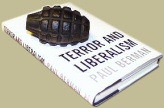 SECULAR PERSPECTIVE ON TERRORISM
SECULAR PERSPECTIVE ON TERRORISM
The best secular read on the mind and motives of Muslim terrorists is Terror and Liberalism by Paul Berman, W. W. Norton & Co. Ltd., 2003. The author is a left leaning secular journalist who has broken ranks with his peers in critically evaluating Islam and the Western liberal response.
My review is at:
www.oprev.org/3rdQtr03.htm#bookreview1
My article summarizing his thesis is at:
www.oprev.org/3rdQtr03.htm#feature1
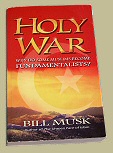 MISSIONARY PERSPECTIVE ON TERRORISTS
MISSIONARY PERSPECTIVE ON TERRORISTS
The best explanation of Muslim terrorism from a Christian perspective is Holy War: Why Do Some Muslims Become Fundamentalists? by Bill Musk, Monarch Books, 2003. The book was ahead of its time being originally published in 1992.
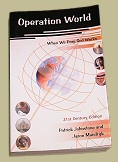 WORLD RELIGION STATISTICS
WORLD RELIGION STATISTICS
The two volume World Christian Encyclopedia by Barrett, Kurian, and Johnson, Oxford University Press, 2001 is the most thorough compilation of data on spiritual conditions and trends in every country. This scholarly work with a $200 price tag is for serious research. A simpler and cheaper source for similar data written as a prayer guide is Operation World, now in its sixth edition, by Patrick Johnstone and Jason Mandryk, U.S. Center for World Mission, 2001.
 MUSLIM MIND AND EMOTIONS
MUSLIM MIND AND EMOTIONS
For understanding how Muslims feel, think, and react in the world I recommend The Cross and the Crescent: Understanding the Muslim Heart and Mind by Phil Parshall, Gabriel Publishing, 2002. This work was originally published by Tyndale House in 1989.
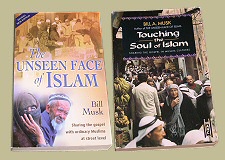 MUSLIMS AND THE SUPERNATURAL WORLD
MUSLIMS AND THE SUPERNATURAL WORLD
For illuminating Muslim superstitions and beliefs about the spirit world I recommend books by Bill Musk. Touching the Soul of Islam was first published by MARC (the publishing arm of World Vision) in 1995. It has had several subsequent reprintings. The Unseen Face of Islam , originally published in 1989, has also been reprinted.
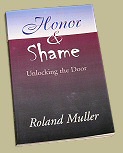 REACHING MUSLIMS
REACHING MUSLIMS
The best book on sharing the gospel using illustrations and Scriptures that will resonate with Muslims is Honor & Shame: Unlocking the Door by Roland Muller, published in 2000 and available from www.rmuller.com
My review is at:
www.oprev.org/SepOct01.htm#resource2
A version of my own article indroducing this topic that was first published in the Evangelical Missions Quarterly in 1994 may be viewed at:
www.oprev.org/1stQtr02.htm#feature3
 HISTORICAL PERSPECTIVE
HISTORICAL PERSPECTIVE
Bernard Lewis is a British scholar of Islam who has been writing for many years. Of the secularists out there, I find his work to be the most accurate, balanced and objective. His response to 9-11, What Went Wrong: Western Impact and Middle Eastern Response was published in 2002 by Oxford University Press.
 MOST COMPREHENSIVE OVERVIEW OF ISLAM
MOST COMPREHENSIVE OVERVIEW OF ISLAM
At just 62 pages, the most comprehensive summary of Muslim theology and culture with practical advice on building relationships is A Muslim Heart: What Every Christian Needs to Know to Share Christ with Muslims, by Edward J. Hoskins, Dawson Media, 2003.
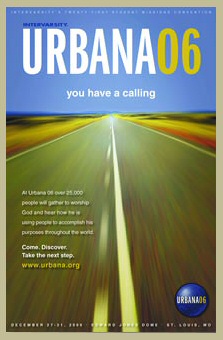
Opportunity:
Urbana 2006 Is Calling
Over 25,000 young people will gather in Saint Louis between Christmas and New Year at Urbana 06 to worship God, hear how he is using people to accomplish his purpose throughout the world, and consider how he might want to use them.
Urbana is the world's largest missions conference thrown only every three years by InterVarsity Christian Fellowship.
With Ephesians 4:1 as its theme, over 200 seminars and workshops, world class missionary speakers, hundreds of exhibitors, small group prayer, and large group worship, Urbana 06 will challenge attendees to consider what it means to "live a life worthy of the calling."
Past attendees guarantee it will be a life changing experience.
Opportunity:
Turks Order New Testament in Record Numbers
Help For Shipping Costs Needed
Response in Turkey to web based advertising for Turkish Language New Testaments was so great that the sponsoring Bible correspondence course organization could not afford the shipping and had to cut back on their advertising. It costs about $2.25 to ship each New Testament and about 50 cents per response for advertising. So less than $3.00 covers the advertising and shipping to get God's
Word into the hands of a Turkish inquirer.
Turkish World Outreach
1-(970) 434-1942
TWO@onlinecol.com
Opportunity:
Taxes Help Fund Language Learning
The LingNet web site is a service provided by the Defense Language Institute (DLI) Foreign Language Center. It features materials developed by DLI's Curriculum Development Division as well as other government and Department of Defense agencies.
Materials include the "Countries in Perspective" series, the Global Language Online Support System (GLOSS), and country familiarization materials such as language survival kits and guides.
Over 10,000 copies of "Iraq in Perspective" were printed and given to deploying troops to supplement familiarization training. GLOSS offers over 1,100 reading and listening lessons in eleven languages.
www.lingnet.org